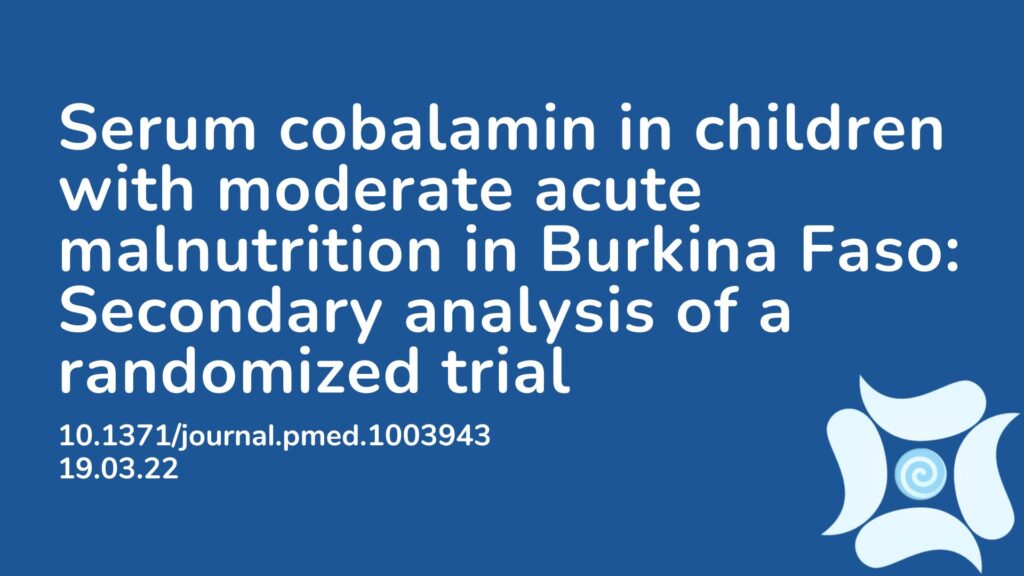Summary: This secondary analysis of a randomised controlled trial explores vitamin B12 levels in children from Burkina Faso. Of the 1,609 children with moderate to acute malnutrition (MAM) that participated in the study, researchers were able to measure vitamin B12 levels in 1,192 children. Serum Cobalamin (SC) was low in two thirds of children with MAM. This is somewhat expected in low socio-economic populations due to food insecurity, resulting in a low intake of animal products and fortified foods. Low income populations are also more likely to have gastrointestinal complications which impact on absorption of nutrients. It is evident that vitamin B12 deficiency leads to poor motor skills and anemia. This paper determined that supplementation availability and accessibility, and the current food supply in low income countries, is not sufficient to meet the demands of children at risk of malnutrition. This study also determined that vitamin B12 supplementation alone may not be adequate to restore serum cobalamin levels (possibly due to malabsorption). However a lipid-based nutrient supplement from soy isolate was superior at raising SC levels. Every year, millions of children are treated for malnutrition, so it is important they are provided with enough cobalamin to support long term development. It is also key that practitioners understand barriers to absorption and utilisation.
Abstract:
Background: Among children with moderate acute malnutrition (MAM) the level of serum cobalamin (SC) and effect of food supplements are unknown. We aimed to assess prevalence and correlates of low SC in children with MAM, associations with hemoglobin and development, and effects of food supplements on SC.
Methods and findings: A randomized 2 × 2 × 3 factorial trial was conducted in Burkina Faso. Children aged 6 to 23 months with MAM received 500 kcal/d as lipid-based nutrient supplement (LNS) or corn–soy blend (CSB), containing dehulled soy (DS) or soy isolate (SI) and 0%, 20%, or 50% of total protein from milk for 3 months. Randomization resulted in baseline equivalence between intervention groups. Data on hemoglobin and development were available at baseline. SC was available at baseline and after 3 and 6 months. SC was available from 1,192 (74.1%) of 1,609 children at baseline. The mean (±SD) age was 12.6 (±5.0) months, and 54% were females. Low mid-upper arm circumference (MUAC; <125 mm) was found in 80.4% (958) of the children and low weight-for-length z-score (WLZ; <−2) in 70.6% (841). Stunting was seen in 38.2% (456). Only 5.9% were not breastfed. Median (IQR) SC was 188 (137; 259) pmol/L. Two-thirds had SC ≤222 pmol/L, which was associated with lower hemoglobin. After age and sex adjustments, very low SC (<112 pmol/L) was associated with 0.21 (95% CI: 0.01; 0.41, p = 0.04) and 0.24 (95% CI: 0.06; 0.42, p = 0.01) z-score lower fine and gross motor development, respectively. SC data were available from 1,330 (85.9%) of 1,548 children followed up after 3 months and 398 (26.5%) of the 1,503 children after 6 months. Based on tobit regression, accounting for left censored data, and adjustments for correlates of missing data, the mean (95% CI) increments in SC from baseline to the 3- and 6-month follow-up were 72 (65; 79, p < 0.001) and 26 (16; 37, p < 0.001) pmol/L, respectively. The changes were similar among the 310 children with SC data at all 3 time points. Yet, the increase was 39 (20; 57, p < 0.001) pmol/L larger in children given LNS compared to CSB if based on SI (interaction, p < 0.001). No effect of milk was found. Four children died, and no child developed an allergic reaction to supplements. The main limitation of this study was that only SC was available as a marker of status and was missing from a quarter of the children.
Conclusions: Low SC is prevalent among children with MAM and may contribute to impaired erythropoiesis and child development. The SC increase during supplementation was inadequate. The bioavailability and adequacy of cobalamin in food supplements should be reconsidered.
Article Publication Date: 19.03.22
DOI: 10.1371/journal.pmed.1003943




